Creating a unique kitchen countertop is a fantastic way to personalize one of the most important spaces in your home. Kitchens are often considered the heart of the home, and the countertop is its centerpiece. While traditional materials like granite, marble, and laminate are popular choices, there’s a growing interest in more unconventional options that offer distinctive aesthetics, functionality, and sustainability. Whether you’re remodeling your kitchen or designing a new one, exploring unique countertop ideas can lead to a one-of-a-kind kitchen that reflects your style and meets your practical needs.
One increasingly popular choice for unique kitchen countertops is recycled glass. This material is not only environmentally friendly but also offers stunning visual appeal. Recycled glass countertops are made from crushed glass pieces set in a resin or cement base, creating a vibrant, mosaic-like surface that can be customized in a range of colors and patterns. The glass can come from various sources, such as bottles or industrial glass, giving the countertop a story and a connection to sustainable practices. These countertops are durable, heat-resistant, and relatively low-maintenance, making them a practical and beautiful option for eco-conscious homeowners.
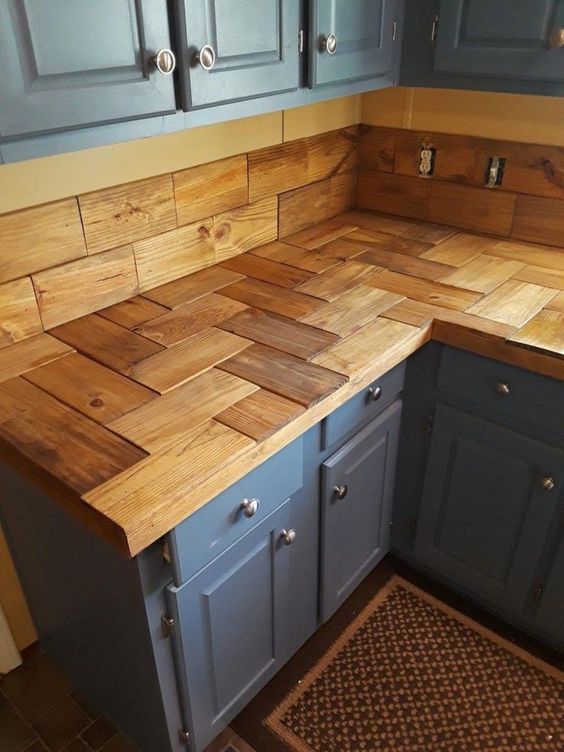
Another innovative material is concrete, which has evolved significantly from its industrial roots to become a sought-after choice for modern kitchen countertops. Concrete countertops are highly customizable, offering an endless array of colors, textures, and finishes. You can choose to have the concrete stained, polished, or even embedded with materials like glass, stones, or shells for a truly unique look. Concrete countertops can also be molded into any shape, allowing for integrated sinks, custom edge details, and other design elements that are difficult to achieve with other materials. However, concrete does require sealing and regular maintenance to prevent stains and cracks.
For those who appreciate the natural beauty of wood but want something more unique than traditional butcher block, live-edge wood countertops offer a stunning alternative. Live-edge countertops retain the natural shape of the tree, including the bark and knots, creating a rustic yet elegant look. Each piece of live-edge wood is unique, with variations in grain, color, and texture that add character to the kitchen. These countertops can be paired with modern or rustic cabinetry to create a warm, inviting space. Like other wood countertops, live-edge wood requires regular sealing and maintenance to protect it from moisture and wear, but the effort is well worth it for the beauty it brings to the kitchen.
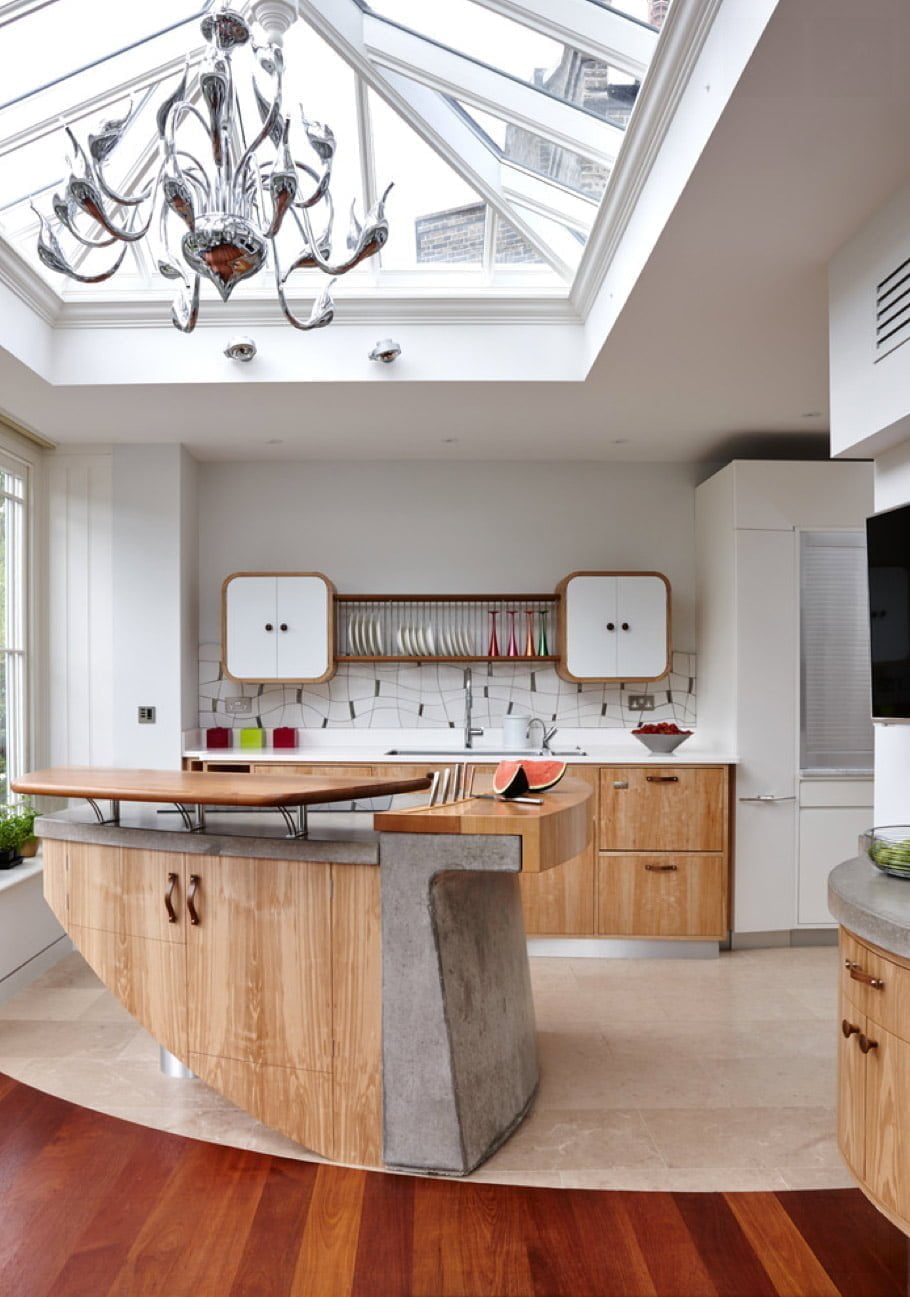
Metal countertops are another unconventional option that can give your kitchen a distinctive, contemporary feel. Stainless steel is a popular choice for professional kitchens due to its durability, heat resistance, and ease of cleaning. However, if you’re looking for something more unique, consider copper or zinc countertops. Copper develops a natural patina over time, changing color and adding character as it ages. Zinc, on the other hand, has a softer, more matte finish and also develops a patina, but in a subtler, bluish-gray tone. Both materials are antimicrobial, making them a hygienic choice for the kitchen. Metal countertops are also relatively easy to maintain, though they can scratch and dent, which adds to their unique, lived-in look.
For a truly luxurious and unique kitchen countertop, consider using semi-precious stones like agate, amethyst, or quartz. These materials are often used in jewelry and decorative objects, but when cut and polished into slabs, they make stunning countertops. Semi-precious stone countertops are available in a wide range of colors and patterns, each piece a work of art. They are typically backlit to highlight the stone’s natural translucence, creating a glowing effect that adds elegance and sophistication to the kitchen. While these countertops are more expensive than traditional materials, they are incredibly durable and can serve as the focal point of a high-end kitchen design.

Repurposed materials also offer unique possibilities for kitchen countertops. For example, reclaimed wood from old barns, ships, or other sources can be transformed into a beautiful, weathered countertop with a rich history. Similarly, reclaimed stone, such as marble or granite from demolished buildings, can be cut and refinished to create a unique surface that combines sustainability with timeless beauty. Repurposed materials not only add character to your kitchen but also contribute to environmental conservation by reducing waste and the demand for new resources.
Another creative option is the use of tile for kitchen countertops. While tile has been used in kitchens for centuries, modern designs and materials have brought it back into vogue as a unique countertop choice. Large-format tiles, mosaics, or hand-painted tiles can be used to create intricate patterns and designs that are both functional and artistic. Tile countertops are also relatively affordable and easy to install, making them an attractive option for DIY enthusiasts. However, grout lines can be challenging to keep clean, so it’s important to seal the grout properly and choose tiles that are easy to maintain.
For those who want a truly customized kitchen countertop, consider resin or epoxy. These materials can be poured over almost any surface, creating a smooth, durable, and waterproof finish. Resin countertops can be customized with colors, metallics, or even embedded objects like shells, leaves, or photographs to create a unique, personalized surface. The possibilities are nearly endless, making resin a great choice for creative homeowners who want a one-of-a-kind kitchen. Resin countertops are also heat-resistant and easy to clean, though they can scratch, so it’s important to use cutting boards and avoid abrasive cleaners.
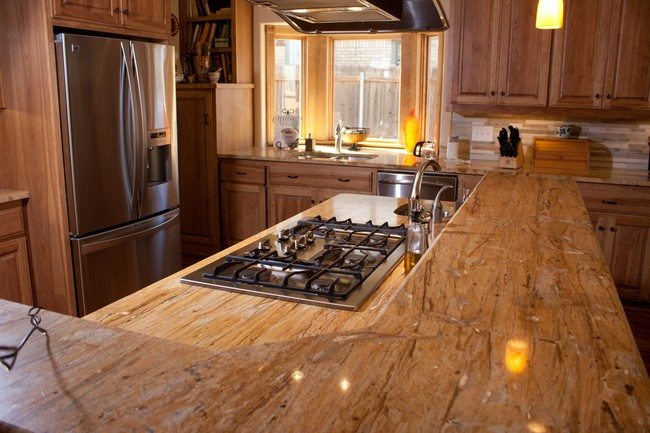
Recycled paper countertops, made from compressed paper fibers and resin, offer another eco-friendly and unique option. These countertops are surprisingly durable, with a smooth, matte finish that resembles stone or solid surface materials. Recycled paper countertops are available in a variety of colors and are resistant to heat, stains, and scratches. They are also lightweight and can be fabricated into various shapes and sizes, making them versatile for different kitchen layouts. These countertops require regular maintenance, including sealing, to keep them in good condition, but they offer a sustainable and stylish alternative to traditional materials.
Another innovative countertop material is terrazzo, which is making a comeback in modern kitchen design. Terrazzo is made from a mix of marble, quartz, glass, or other aggregates set in a cement or resin base. The surface is then polished to a high sheen, creating a smooth, speckled appearance that is both durable and visually striking. Terrazzo countertops are available in a wide range of colors and patterns, allowing for a high degree of customization. They are also highly durable and resistant to stains and scratches, making them a practical choice for busy kitchens. The history and versatility of terrazzo make it a timeless yet unique option for kitchen countertops.
For a sleek, modern look, glass countertops offer a unique and contemporary alternative. Glass countertops can be clear, frosted, or colored, and they can be backlit to create a glowing effect. They are non-porous, making them highly resistant to stains and easy to clean, which is ideal for a kitchen environment. However, glass countertops can be prone to scratching and chipping, so they require careful handling. Despite these challenges, the reflective surface of the glass can make a kitchen feel larger and brighter, adding a sense of spaciousness and modern elegance.
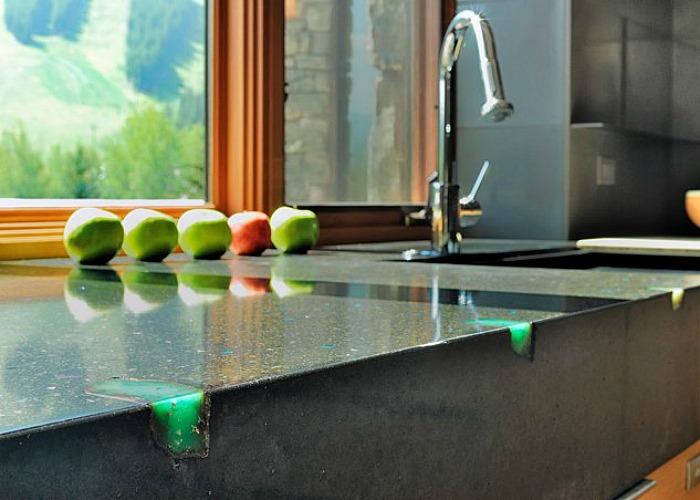
For those who love the look of natural stone but want something more unique, consider soapstone or slate. These materials offer a distinctive, muted color palette, with shades ranging from deep charcoal to soft gray-green. Soapstone is known for its smooth, matte finish and its ability to resist stains and heat. Slate, with its subtle texture and natural variation, provides a durable and low-maintenance surface. Both materials are less common than granite or marble, making them a unique choice that adds understated elegance to a kitchen design. They also require minimal maintenance, with periodic oiling for soapstone being the primary upkeep needed.
Concrete combined with inlays offers a unique opportunity to incorporate personal elements into your kitchen countertop. By embedding materials such as metal, glass, or even fossils into the concrete, you can create a countertop that tells a story and reflects your style. The concrete can be colored or stained to complement the inlays, resulting in a truly one-of-a-kind countertop. This approach not only adds visual interest but also creates a conversation piece that sets your kitchen apart from the ordinary.
Finally, a unique approach to kitchen countertops is the use of mixed materials. Combining different materials, such as wood and stone, metal and glass, or concrete and tile, can create a striking and personalized countertop. For example, a countertop might feature a granite section for food preparation, a wood section for dining, and a stainless-steel section for baking. This not only adds functionality but also introduces varied textures and colors, making the kitchen more dynamic and visually interesting. Mixed material countertops require careful planning to ensure that the materials complement each other and meet the practical needs of the kitchen.

Common Mistakes to Avoid
Overlooking Functionality for Aesthetics: One of the most common mistakes is prioritizing the unique look of a countertop over its practicality. While a countertop might be visually stunning, it’s essential to ensure that it meets the functional needs of your kitchen. Consider factors such as durability, maintenance, and heat resistance to avoid choosing a material that looks great but doesn’t perform well in a busy kitchen environment.
Neglecting Proper Sealing and Maintenance: Many unique countertop materials, such as concrete, wood, and recycled paper, require regular sealing and maintenance to keep them looking their best. A common mistake is neglecting these upkeep tasks, which can lead to stains, scratches, and other damage. It’s important to understand the maintenance requirements of your chosen countertop material and commit to keeping it properly sealed and cleaned.
Ignoring Weight and Structural Support: Some unique countertop materials, such as concrete and recycled glass, can be very heavy, requiring additional structural support in your cabinetry. Failing to account for this can lead to issues with your cabinets or even structural damage over time. It’s crucial to work with a professional to ensure that your kitchen can support the weight of your chosen countertop.
Choosing Incompatible Materials for Mixed Countertops: While mixed material countertops can be beautiful and functional, a common mistake is choosing materials that don’t work well together. For example, pairing a soft material like wood with a hard material like stone can lead to uneven wear. It’s important to choose materials that complement each other both aesthetically and functionally, ensuring a cohesive and durable countertop.
Underestimating the Cost of Unique Materials: Unique countertop materials, especially those like semi-precious stones or custom inlays, can be significantly more expensive than traditional options. A common mistake is underestimating the cost and going over budget. It’s important to carefully budget for your countertop and consider not only the material costs but also the installation and maintenance expenses.
Failing to Consider Long-Term Trends: While unique countertops can make a bold statement, a common mistake is choosing a material that is too trendy and may become outdated quickly. It’s important to balance uniqueness with timelessness, choosing a material that reflects your style but will also stand the test of time. This ensures that your kitchen remains stylish and functional for years to come.
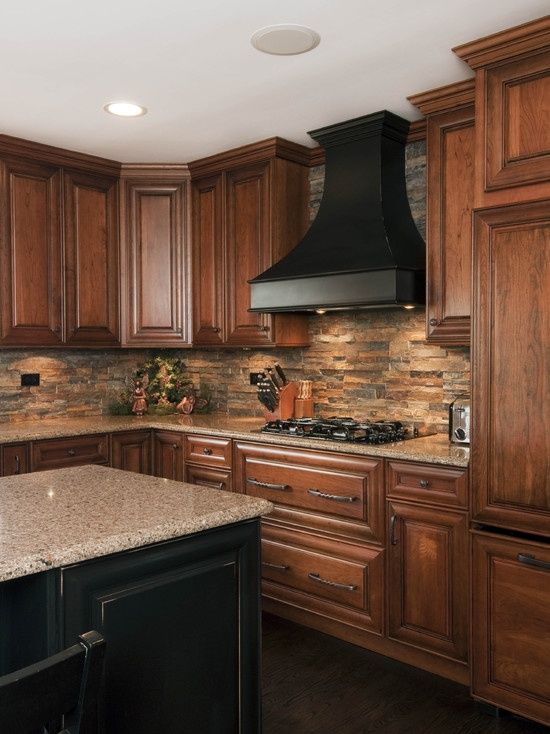
What is the most durable unique countertop material?
Among unique countertop materials, concrete and recycled glass are known for their durability. Concrete is incredibly strong and can be customized in a variety of finishes, though it does require sealing to prevent stains. Recycled glass countertops are also highly durable, combining the strength of glass with a solid resin or cement base. Both materials can withstand the wear and tear of daily kitchen use while offering distinctive visual appeal.
Are recycled materials good for kitchen countertops?
Yes, recycled materials can be an excellent choice for kitchen countertops. They offer a sustainable option that reduces environmental impact while providing unique aesthetics. Recycled glass, paper, and even reclaimed wood or stone can be transformed into beautiful countertops that are both durable and eco-friendly. These materials often have interesting textures and colors that add character to a kitchen, and they can be just as functional as traditional countertop materials.
How do I maintain a live-edge wood countertop?
Maintaining a live-edge wood countertop involves regular cleaning and periodic resealing. Use a mild soap and water solution for daily cleaning, and avoid harsh chemicals that can damage the wood. Resealing is necessary to protect the wood from moisture and stains; this should be done every few months, depending on the level of use. Additionally, it’s important to use cutting boards and trivets to prevent scratches and heat damage.
Can I mix different countertop materials in my kitchen?
Yes, mixing different countertop materials in a kitchen can create a unique and functional space. Combining materials like wood and stone, or concrete and metal, allows you to take advantage of the strengths of each material in specific areas of your kitchen. For example, you might choose a durable stone surface for food preparation and a warmer wood surface for a dining area. The key is to ensure that the materials complement each other both in function and design.
Are glass countertops practical for everyday use?
Glass countertops can be practical for everyday use, but they do require careful handling. Glass is non-porous, making it easy to clean and resistant to stains, but it can scratch and chip if not properly cared for. Using cutting boards and avoiding heavy impacts can help maintain the appearance of a glass countertop. Additionally, glass countertops can be backlit to create a unique visual effect, adding both style and functionality to your kitchen.
What is the cost of installing unique kitchen countertops?
The cost of installing unique kitchen countertops varies widely depending on the material and complexity of the design. Materials like semi-precious stones or custom inlays tend to be more expensive, while options like concrete or recycled glass can be more affordable. Additionally, the installation process for unique materials can be more complex and costly. It’s important to get detailed quotes from professionals and budget for both the material and installation costs, keeping in mind any additional expenses for maintenance and upkeep.
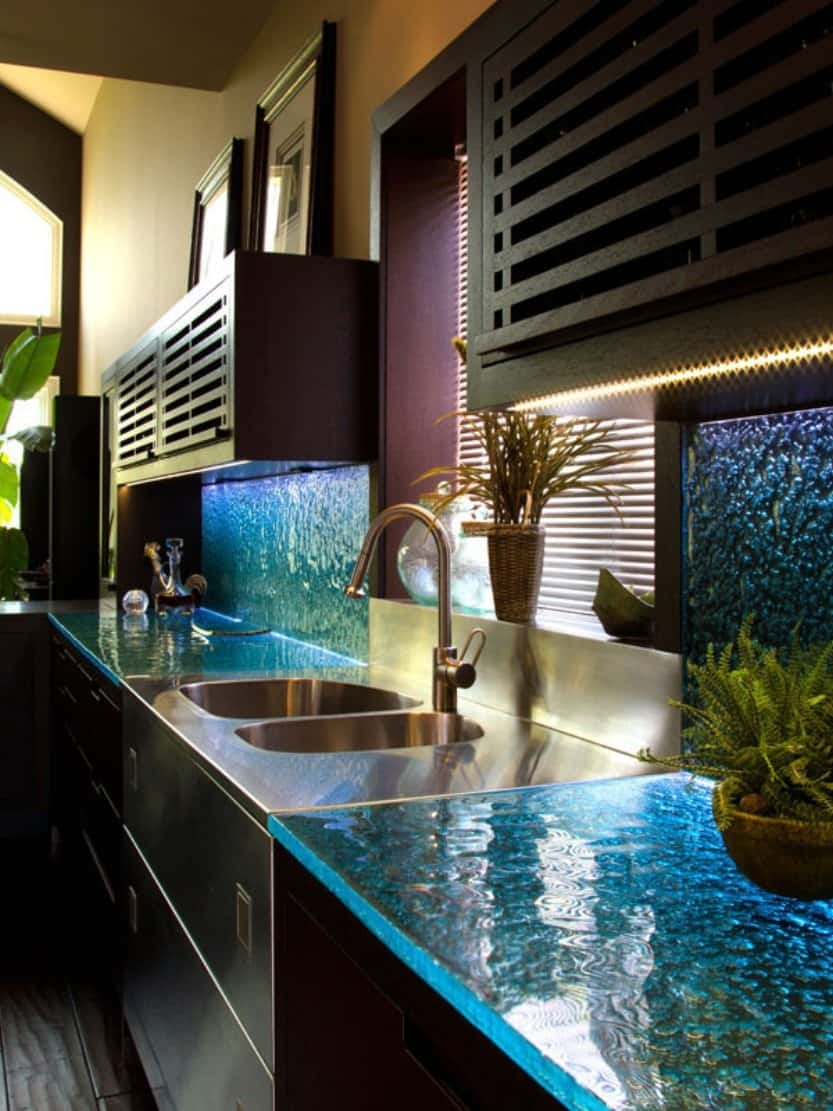
Related Posts:
- Kitchen Design White Countertops
- Old Kitchen Countertops
- Kitchen Countertop Outlet Spacing
- Inexpensive Kitchen Countertop Ideas
- Black Countertop Kitchen Ideas
- Colour Combinations For Kitchen Cabinets And Countertops
- How To Renovate Kitchen Countertops
- Stone Kitchen Countertops
- Kitchen Countertops Orlando Fl
- Contrasting Kitchen Island Countertop